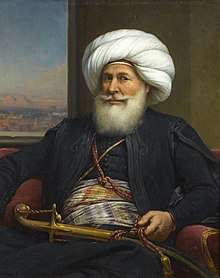Khedive
Khedive (/kəˈdiːv/, Ottoman Turkish: الخدیوی hıdīv) was an honorific title of Persian origin used for the sultans and grand viziers of the Ottoman Empire, but most famously for the viceroy of Egypt from 1805 to 1914.[1]
It is attested in Persian poetry from the 10th century and was used as an Ottoman honorific from the 16th. It was borrowed into Turkish directly from Persian.[1] It was first used in Egypt, without official recognition, by Muhammad Ali Pasha, the Albanian governor of Egypt and Sudan from 1805 to 1848. The initially self-declared title was officially recognized by the Ottoman government in 1867, and used subsequently by Ismail Pasha, and his dynastic successors until 1914.[2] The term entered Arabic in Egypt in the 1850s.[1]
Etymology
This title is recorded in English since 1867, borrowed from French khédive, in turn from Ottoman Turkish خدیو hıdiv, from Persian خدیو khadīv ("lord").[2]
Egypt in the 19th and early 20th centuries
Wilāyah (1805–1867)
Following the French invasion of Egypt in 1798 and Napoleon's defeat of Egyptian forces, which consisted largely of the ruling Mamluk military caste, the Ottoman Empire dispatched troops from Rumelia (the Balkan provinces of the Ottoman Empire) under the command of Muhammad Ali Pasha to restore the Empire's authority in what had hitherto been an Ottoman province. However, upon the French defeat and departure, Muhammad Ali seized control of the country, and declared himself ruler of Egypt, quickly consolidating an independent local powerbase. After repeated failed attempts to remove and kill him, in 1805, the Sublime Porte officially recognized Muhammad Ali as Pasha and Wāli (Governor) of Egypt. However, demonstrating his grander ambitions, he claimed for himself the higher title of Khedive (Viceroy), as did his successors, Abbas I, Sa'id I and Ibrahim Pasha.
Khedivate (1867–1914)
The Muhammad Ali dynasty’s use of the title Khedive was not sanctioned by the Ottoman Empire until 1867[2] when Sultan Abdülaziz officially recognized it as the title of Ismail Pasha. Moreover, the Porte accepted Ismail's alteration of the royal line of succession to go from father to son, rather than brother to brother, as was the tradition in the Ottoman Empire, and Arab dynasties. In May 1879, the British Empire and France began pressuring the Ottoman Sultan Abdülhamid II to depose Ismail Pasha, and this was done on June 26, 1879. The more pliable Tewfik Pasha, Ismail's son, was made his successor as the new Khedive. Ismail Pasha left Egypt and initially went into exile to Naples, but was eventually permitted by Sultan Abdülhamid II to retire to his Palace of Emirgan[3] on the Bosphorus in Istanbul. There he remained, more or less a state prisoner, until his death. He was later buried in Cairo.
After the nationalist Urabi Revolt of 1882, Britain invaded Egypt in support of Tewfik Pasha, and would continue to occupy and dominate the country for decades. During this period, the Muhammad Ali Dynasty under Tewfik Pasha and his son Abbas Hilmi Pasha continued to rule Egypt and Sudan using the title Khedive, whilst still under nominal (de jure) Ottoman sovereignty until 1914.[2]
Abbas Hilmi Pasha was deposed by the British in 1914, and Egypt was declared a protectorate of Britain, the Sultanate of Egypt, which was ruled by Abbas's uncle Hussein Kamel under the title of Sultan.
References
- Adam Mestyan, "Khedive", Encyclopaedia of Islam, Three (Leiden: Brill, 2020), 2:70–71.
- Encyclopædia Britannica: Ismail Pasha, Ottoman Viceroy of Egypt
- Historic photo of the Khedive Ismail Pasha Palace (Hıdiv İsmail Paşa Sarayı) which once stood in the Emirgan neighbourhood of Istanbul, on the European coast of the Bosphorus.
External links
- Mestyan, Adam (2020). "Khedive". In Fleet, Kate; Krämer, Gudrun; Matringe, Denis; Nawas, John; Rowson, Everett (eds.). Encyclopaedia of Islam, THREE. Brill Online. ISSN 1873-9830.
- Etymonline
| Regnal titles | ||
|---|---|---|
| Preceded by Wāli |
Style of the Egyptian sovereign 1867–1914 |
Succeeded by Sultan of Egypt |
